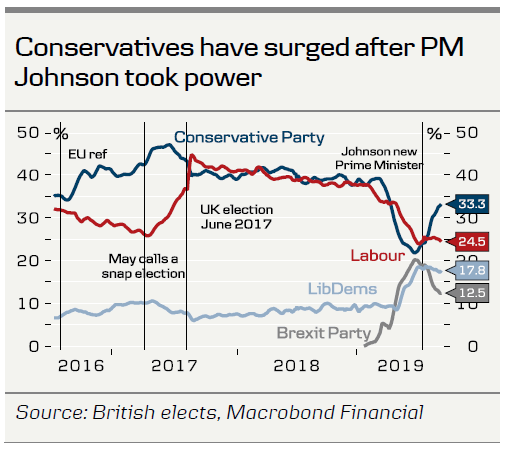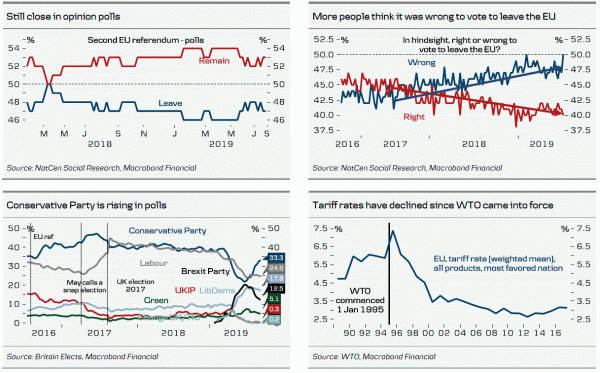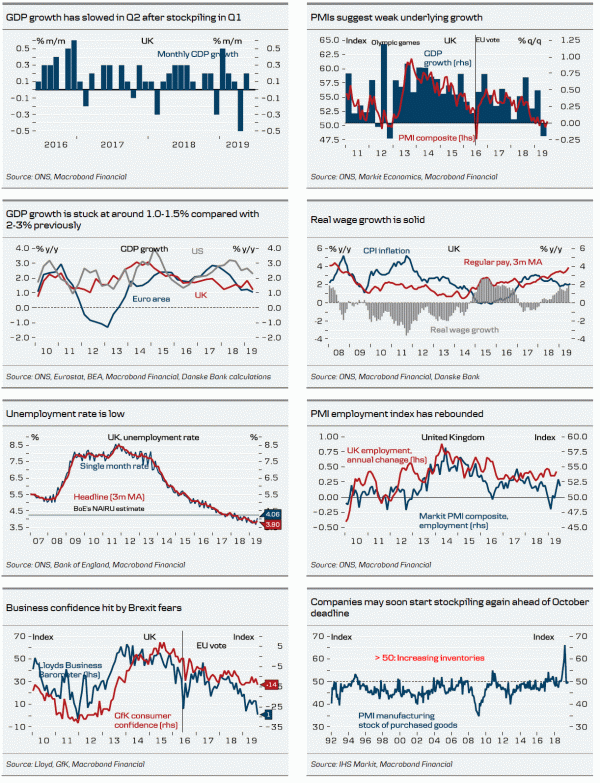Today’s key points
- The Brexit delay bill is likely to come into law before a snap election is called early next week
- Conservative Party is now a fully pro- Brexit party. More loyal MPs after an election but more difficult for them to win.
- Snap election will be a proxy Brexit referendum.
- The EU and the UK are unlikely to negotiate further until after a general election.
- Conservatives have surged in polls after Johnson took power but difficult to translate into mandates
Expect Brexit delay bill to pass before snap election is called
Late last night, the Johnson government lost a key vote in the House of Commons meaning there will now be a debate (and later a vote) on a Brexit extension bill forcing the UK government to ask the EU for an extension if the politicians have not agreed to leave the EU with/without a deal by 19 October. There is very likely a majority for the Brexit delay bill. There was no big market reaction to the result, as it was very much anticipated. After the defeat, PM Boris Johnson said he would put forward a proposal today, calling for a snap election on 15 October. The opposition parties have rejected supporting this until the Brexit extension bill has passed, which it likely will early next week, possibly Monday. As calling for snap election requires a two-third majority, Johnson is probably unable to prevent the Brexit extension bill from passing (despite the attempt to filibuster the bill in the House of Lords). One way around this, however, seems be to amend the Fixed Term Parliament Act, which only requires a simple majority. Whether that is could probably depends on the SNP.
Of the Conservative MPs 21 voted against the government. They are now expelled from the party and are unable to stand in the possible upcoming election. It is difficult to say at this point, what the consequences are. It could imply that Johnson gets a more loyal/pro-Brexit group of Conservative MPs increasing the probability of a no-deal Brexit. The Conservative Party is no longer a divided party but a Brexit party. On the other hand, it may also reduce the chance of the Conservative Party winning the constituencies the rebels represented, as many voters are more moderate on the Brexit question. Some of the Conservative rebels may also try to win their seat as independent candidate.
If we are right that we are heading for a snap election very soon, the election will be a proxy Brexit referendum. Boris Johnson will ask the voters to support his Brexit ‘do or die’ strategy giving him a larger majority (in case he can easily repeal the Brexit extension bill again). Labour, SNP, Greens and LibDems will likely campaign for a second EU referendum (disagreeing on how to frame the question though!).
The chaotic political situation in the UK (and possible snap election) means it is very hard to imagine any real discussions/negotiations with the EU will take place now. It is also worth noting that the EU yesterday revealed that the UK had committed to send proposals on the backstop three weeks ago but has not done it. The EU has also informed the UK that nothing has changed despite the press reporting a change in EU rhetoric around the G7 meeting.
Looking at polls, the support for the Conservative Party has surged after PM Boris Johnson took office (at the expense of the Brexit Party). Given the ‘winner takes it all’ political system, it is difficult to translate the lead into a number of mandates. In Scotland, the Conservatives won 13 seats in 2017 but are expected to only win a few in an upcoming election. Also, remember PM Theresa May entered the election campaign in 2017 with an even bigger margin to Labour



